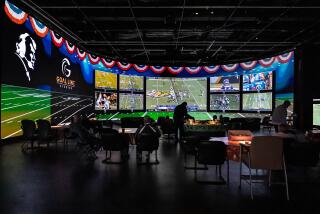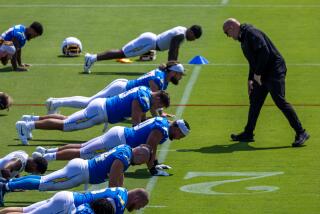Wild Super Bowl stories from Steve Sabol: Death and robbery in New Orleans
Steve Sabol, who helped his father, Ed, found NFL Films in 1962, sat down with The Times’ Sam Farmer in 2010 and shared some of his behind-the-scenes Super Bowl stories. Sabol passed away in September 2012.
There have been nine Super Bowls in New Orleans, and not all of them have brought the best of luck to NFL Films.
We got robbed twice there, got food poisoning, and my hotel room was broken into on the day the Bears played the Patriots in January 1986.
MORE: How Vince Lombardi’s Super Bowl win was spoiled by a tie
We had a little sign on the room that said NFL Films, and that obviously caught someone’s eye. I had a suite with a big TV in there because I was showing “Road to the Super Bowl” to the media.
On game day, somebody broke into the room, and although they didn’t really steal anything, they sure made a mess.
The garbage pail was stuffed with pizza boxes and Cokes, and there was a bill for $600 in room service. They just sat and watched the game on the big screen. When the game was over, they left.
But our most memorable story came at one of the earlier Super Bowls in New Orleans.
MORE: Odd man in the Steelers’ shower
We were staying at a place called the Bienville House. It’s still there, on Decatur Street. We had a group of about 40 people then, and a lot of equipment.
When we went to check in, the concierge said, “Oh, N-F-L, does that stand for National Football League? We have 20 rooms for you.” And my father told him we needed more rooms. We needed storage for our equipment, and we had booked more than 20 rooms.
And the concierge said, “We had to re-sell your rooms. There’s a dry cleaners convention here, and they’re paying more money.”
We had 10 people who had no place to stay. Everything in town was booked. Luckily, one of our assistant cameramen -- actually, he was an amateur photographer and he knew how to load the cameras -- was a doctor at a local hospital. He said he could arrange a place for us to stay, a place we might not expect: the hospital where he worked.
So we drew straws, and 10 guys went to the hospital, where they were admitted under the designation “unconfining observation.” That meant they could come and go as they pleased. I’d never heard of that, but it was really resourceful.
Our head cameraman was named Moe Kellman, and he got one of the hospital rooms. He didn’t have a private room, though; he shared it with a guy hooked up to some kind of defibrillator, with tubes coming out of him and everything. This guy was legitimately sick. But he could talk.
The next night we had a meeting, and Moe comes in looking sick. He was our oldest cameraman, in his 60s, and he was white as a sheet. He comes in and says, “The guy next to me died last night. I was talking to him and went to bed. The next thing I know, that machine showed a flat line and was buzzing. They were pounding on his chest. I’ve never been in a situation like that. I don’t know if I can work today. I’m really upset.”
So we had to switch our main guy to an isolation camera, he was so emotionally overwrought. He said, “I’ve never been next to a man who died in the middle of the night. Plus, I knew his name. He was a World War II veteran. We’d talked about our children.”
That was a strange trip.
Follow Sam Farmer on Twitter @LATimesFarmer
MORE ON THE SUPER BOWL
The greatest moments in Super Bowl history, Nos. 20-11
Column: Welcome to the Super Bowl, where nothing is out of bounds
They’re crazy about the Panthers in Denver — Denver, North Carolina, that is
More to Read
Go beyond the scoreboard
Get the latest on L.A.'s teams in the daily Sports Report newsletter.
You may occasionally receive promotional content from the Los Angeles Times.











